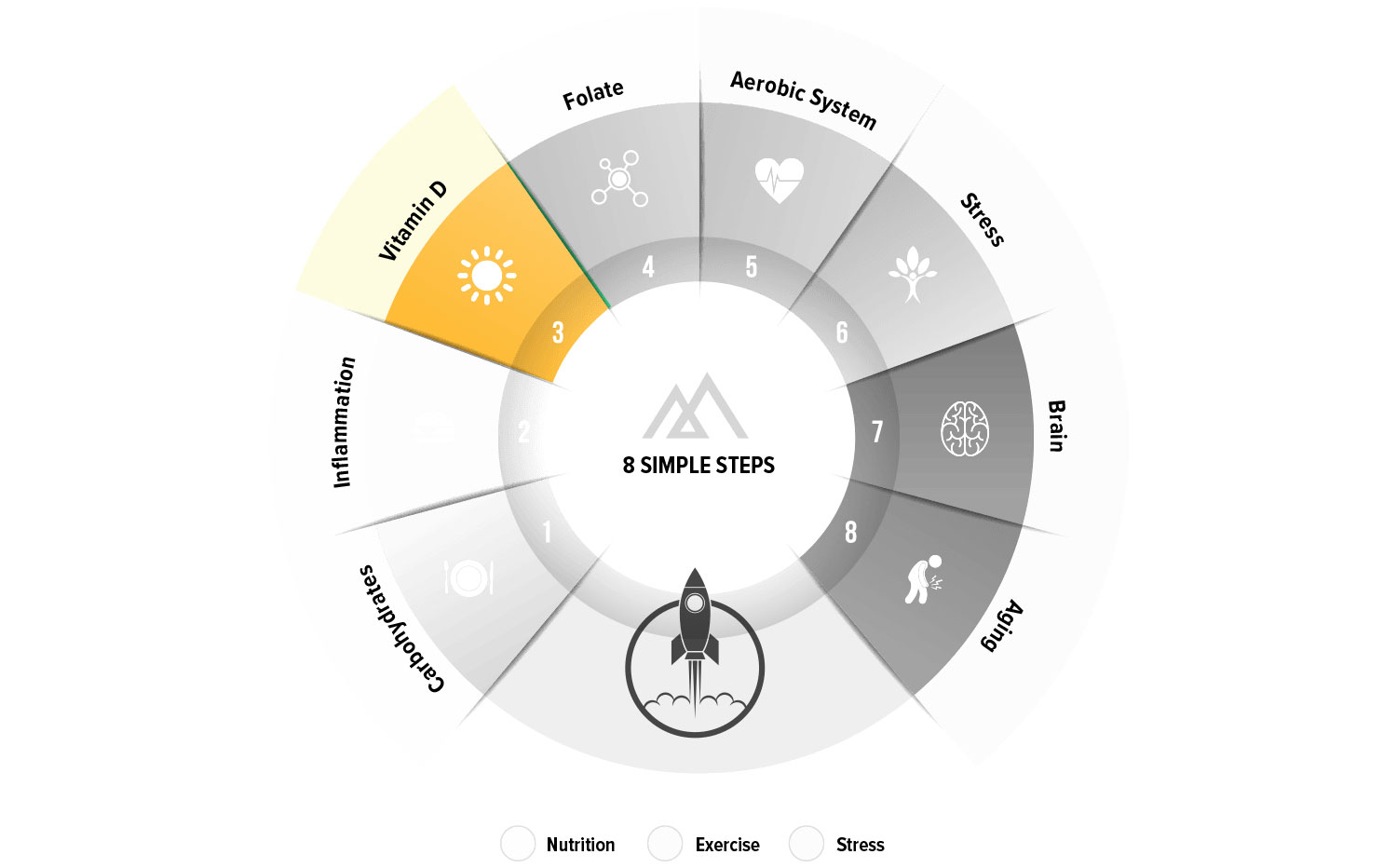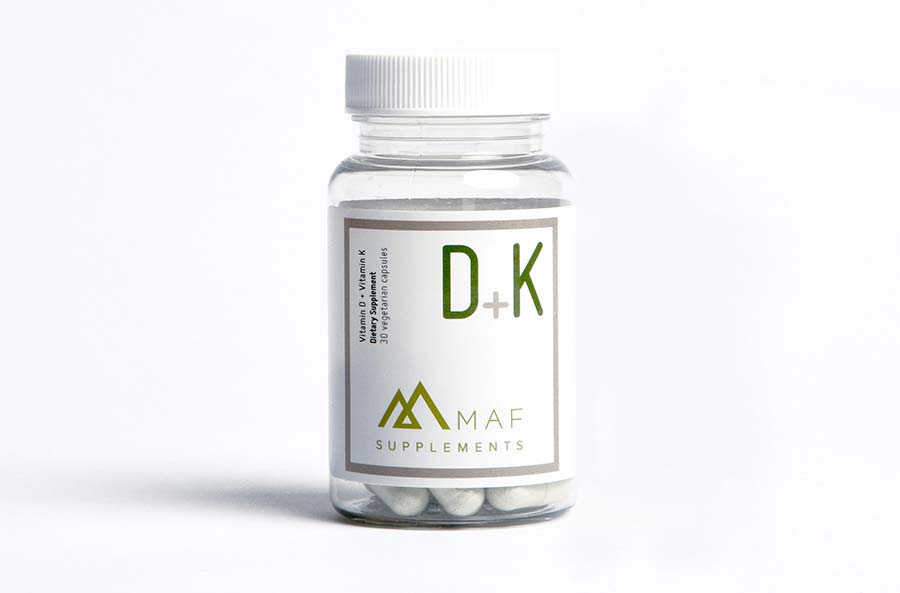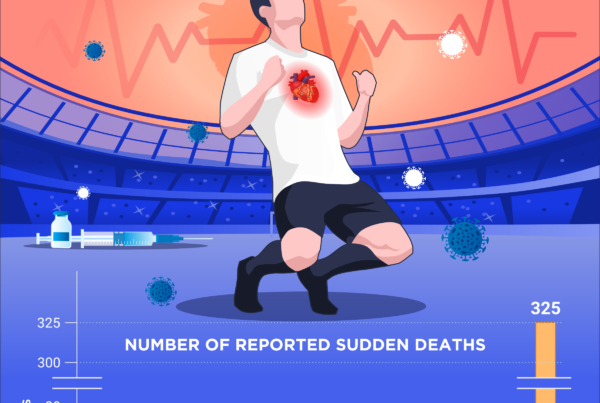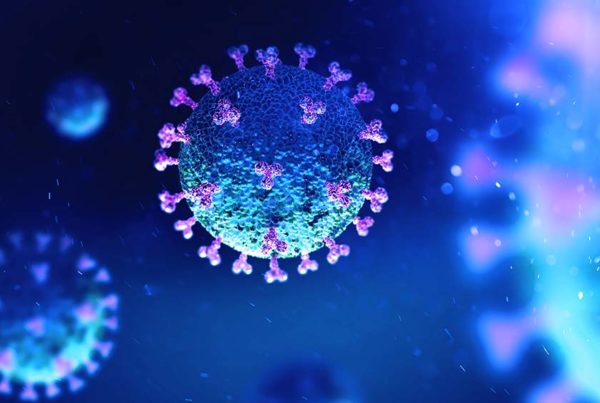
“The MAF Method has 8 Steps. You can’t Skip half of them and expect to get peak results! If you are consistently training to the method and not hitting personal bests you need to go back and look at your nutrition.”
Dr Phil Maffetone (Founder MAF Method)
1. Why Vitamin D is so important to athletic performance
The MAF Method places such a high importance on Vitamin D levels, that it is given a dedicated Step in the system. Why?

The answer is that Vitamin D has a profound impact on health and physical fitness, yet deficiency is very common, even in active athletes.
“Increasing levels of vitamin D reduce inflammation, pain, and myopathy while increasing muscle protein synthesis, ATP concentration, strength, jump height, jump velocity, jump power, exercise capacity, and physical performance.”
Sports Health Benefits of Vitamin D (2012) Franklin D. Shuler, MD, PhD
Vitamin D has been scientifically shown to:
- Improve muscle function
- Prevent bone problems and other mechanical injuries
- Help recovery from training and competition
- Reduce unexplained muscle pains
- Help prevent many health problems including many forms of cancer
There is also strong evidence that Vitamin D can help in maintaining your Mental Health – suppressing Depression and Anxiety. Think of that as a bonus!
Now flip the coin. Sub-optimal Vitamin D status is linked to increased risk for acute illness, inflammatory injury, stress fracture, muscle pain/weakness, sub-optimal muscle performance and depression.
2. The Vitamin D Gap. And how supplements can fill the gap and get you to peak performance.
Deficiency in Vitamin D is very common, even for those living in sunny locations.
There is no known threshold for optimal sports health benefits of Vitamin D. However, peak neuromuscular performance is associated with 25(OH)D levels of 50 ng/mL.
“In athletes, the only group that can normally achieve 25(OH)D levels in this range (50 ng/ml) are lifeguards or people with similar sun exposure to lifeguards.”
The incidence of Vitamin D deficiency in elite indoor athletes is up to 94% of basketball players and 83% of gymnasts.
It should be better for outdoor athletes, right? Actually, recent reports including testing of New York Giants players during spring practice showed that 81% were Vitamin D deficient. In this National Football League study, 25(OH)D in white players averaged 30.3 ng/mL, and African Americans averaged 20.4 ng/mL.
The best way to get Vitamin D naturally is from Sun Exposure. You can also eat the right foods including:
- Wild salmon, sardines and tuna
- Egg yolks
- Dairy products
Consumption of Vitamin D-containing foods alone is not likely to maintain a peak Vitamin D level. Sensible sun exposure (without sunburn) and regular Vitamin D Supplement intake is required to get to the optimum.
3. What to look for when choosing a Vitamin D Supplement, and what to avoid.
Not all Vitamin D is the same. Vitamin D comes in two natural forms, but also comes in synthetic compounds.
What to look for
- The best vitamin D dietary supplement is Vitamin D3. Vitamin D3, also called cholecalciferol, is from animal sources and is the active form, like the Vitamin D obtained from sunlight.
- Look for vitamins that have been created using the freeze-drying method. Most manufacturers process fruit and vegetables using a high-heat cooking or drying process which destroys the nutrients – which are then supplemented by synthetics. A bit like adding fibre back to white bread! Why? Because it’s substantially cheaper and yet they can claim “packed with whole foods”.
- Get the right dose. We know that most athletes aren’t getting enough Vitamin D. And yet excessive amounts may do more harm to your body than good. Avoid mega-doses. Your target dose will depend on your current levels, sunlight exposure and nutrition – but MAF recommends a daily dose of 50 mcg (2000 IU).
What to avoid
- Vitamin D2, called ergocalciferol, comes from plants and is harder for your body to absorb. You should avoid D2 and shoot for D3.
- Avoid synthetic Vitamin D compounds, the most common being calcitriol, doxercalciferol and calcipotriene. Why put this stuff in your body, when you can get it from natural sources?
- Overdosing. Vitamin D supplements can be toxic in high amounts. You cannot overdose on Vitamin D from the sun, but there are other risks associated with long-term sun exposure such as skin cancer.
- Beware of “natural” labelling – unless you trust the source. The use of the word natural has reached the level of abuse. A bottle of 100% synthetic Vitamin D, for example, may be labelled “natural.” Some companies even claim their products are made from real food with real vitamins when, in fact, they feed synthetic vitamins to yeast, then harvest the yeast to use in supplements. With no adequate legal definition, any company can use the word “natural”.
Is it time to review your Vitamin D Supplement?
MAF Supplements are the ONLY supplements scientifically formulated to support athletes using the MAF Method. Get the most out of your training (and life).
As a gift to the MAF community before Xmas hits us, we have a Special Offer for the NEXT 48 HOURS ONLY – Get your first order of MAF Vitamin D&K for just $1 (Free Shipping)









